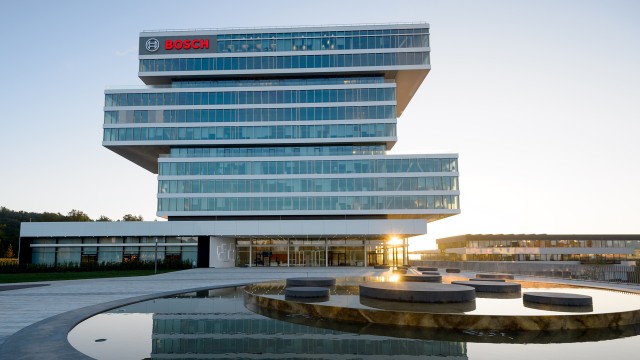Stuttgart, Germany – Bosch has presented the Bosch AI Young Researcher Award, endowed with 50,000 euros, for the first time. Dr. Gergely Neu, scientist at Pompeu Fabra University in Barcelona, won the jury over with his basic research in reinforcement learning (RL), an area of artificial intelligence (AI). Dr. Michael Bolle, management board member, Chief Digital Officer and Chief Technology Officer at Bosch, congratulated the 34-year-old honoree on his excellent achievements as he presented him with the Bosch AI Young Researcher Award at Bosch AI CON 2019 in Renningen. “This award is a way for the Bosch Center for Artificial Intelligence to recognize the exceptional achievements of young researchers in artificial intelligence,” Bolle says. “Gergely Neu’s research plays a major role in making AI more robust, more reliable, and more understandable.” The five-person jury of researchers from academia and industry reviewed submissions from across Europe and honored Neu’s application as the most promising, not least due to his research on probability theory. Neu’s work focuses on known “multi-armed bandit problems” through which algorithms learn to find their way through countless situations that can be combined in myriad ways.
About Bosch
The Bosch Group is a leading global supplier of technology and services. It employs roughly 412,000 associates worldwide (as of December 31, 2025). According to preliminary figures, the company generated sales of 91 billion euros in 2025. Its operations are divided into four business sectors: Mobility, Industrial Technology, Consumer Goods, and Energy and Building Technology. With its business activities, the company aims to use technology to help shape universal trends such as automation, electrification, digitalization, connectivity, and an orientation to sustainability. In this context, Bosch’s broad diversification across regions and industries strengthens its innovativeness and robustness. Bosch uses its proven expertise in sensor technology, software, and services to offer customers cross-domain solutions from a single source. It also applies its expertise in connectivity and artificial intelligence in order to develop and manufacture user-friendly, sustainable products. With technology that is “Invented for life,” Bosch wants to help improve quality of life and conserve natural resources. The Bosch Group comprises Robert Bosch GmbH and its roughly 490 subsidiary and regional companies in over 60 countries. Including sales and service partners, Bosch’s global manufacturing, engineering, and sales network covers nearly every country in the world. Bosch’s innovative strength is key to the company’s further development. At 136 locations across the globe, Bosch employs some 82,000 associates in research and development.
The company was set up in Stuttgart in 1886 by Robert Bosch (1861-1942) as “Workshop for Precision Mechanics and Electrical Engineering.” The special ownership structure of Robert Bosch GmbH guarantees the entrepreneurial freedom of the Bosch Group, making it possible for the company to plan over the long term and to undertake significant upfront investments in the safeguarding of its future. Ninety-four percent of the share capital of Robert Bosch GmbH is held by Robert Bosch Stiftung GmbH, a limited liability company with a charitable purpose. The remaining shares are held by Robert Bosch GmbH and by a company owned by the Bosch family. The majority of voting rights are held by Robert Bosch Industrietreuhand KG. It is entrusted with the task of safeguarding the company’s long-term existence and in particular its financial independence – in line with the mission handed down in the will of the company’s founder, Robert Bosch.
Additional information is available online at www.bosch.com, www.bosch-press.com.





